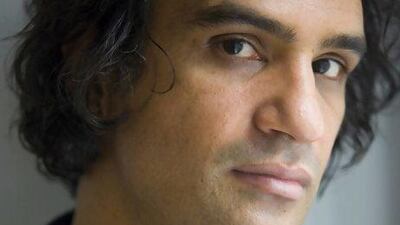There's dedication to the art of novel writing and then there's obsession with it. When the Pakistan-born, British-based author Nadeem Aslam was writing about the title character in his new book The Blind Man's Garden, he felt uneasy asking those with failing sight what it was "like". "It seemed too close to the nerve," he says. So Aslam put cotton pads over his eyes, taped them up and lived as a blind person for one week every year, during the past three years of writing.
Given that the "hero" of the book, Mikal, has his trigger fingers sliced off by an Afghan warlord, it's impossible not to cast a worried glance at Aslam's hands. Thankfully, he appears to have five digits on each. "But I did tape them back for a week to see if Mikal could still fire a gun," he smiles.
Is such painful fidelity to real experience completely necessary?
"Well, yes," Aslam says, extending the "yes" as if going blind and taping up his hands was the most obvious course of action a novelist could take. But in Aslam's case, it makes a lot of sense. Over three previous books that have taken on life in Pakistan, the immigrant experience in England and the modern-day tragedies of Afghanistan (Season of the Rainbirds, Maps for Lost Lovers and The Wasted Vigil), Aslam has developed into a writer who has the rare gift of pinpointing poetry in savagery without ever losing sight of storytelling.
"All the little details are worked on to be as exact as possible for a reason," he says. "I think it reassures readers that because I've done so much work on them, they can believe I've thought as deeply about the big issues in the book, too."
And it is a book full of issues. It begins just after September 11, 2001. The invasion of Afghanistan by US troops has commenced and two foster brothers from a Punjabi town in Pakistan cross the border in the idealistic hope they can provide medical assistance. But one is captured by an Afghan warlord and then delivered, for cash, to the Americans as a suspected terrorist. Meanwhile, back in the town, the inequalities between sexes and classes are laid bare. Most impressive is the dazzlingly confident pacing: Mikal can be involved in a shoot-out not dissimilar to a blockbusting thriller; then, in the very next chapter, pages are spent describing the pruning of orchids.
"We've lived through an extraordinary decade," says Aslam. "It began with 9/11 and ended with the Arab Spring, but between that we had the war on terror, the call to jihad, the invasions on Iraq and Afghanistan, Guantanamo, Abu Ghraib, the murder of Benazir Bhutto, the assassination of Osama bin Laden. I wanted to find a story which would encapsulate all this without the story losing its shape. Writers don't tell you what to think, they tell you what to think about."
In desperation, the blind man Rohan - driven to despair by the ruination of everything he holds dear - asks: "Who will speak the complicated truth?" The measure of the novel's success is that, by the end, it feels as if Aslam has done just that as a novelist. He never takes sides; Mikal says September 11 is a disgusting crime but it's cast as an event with its root in the misguided policies of the past 40 years.
"The key sentence of the entire novel is on the very first page, where Rohan tells his young son not to be frightened of the villain in a fairy tale because he will not triumph in the end. And the child understands this but worries that before the villain loses he harms the good people. How do you tell someone who has suffered from a drone attack that it's OK now because the bombings have stopped? Let's say the Taliban disappear tomorrow. How do people deal with the fact that while they were in power they killed their family member? Sometimes it can seem as if you can never get over anything in your entire life."
The Blind Man's Garden probably can't help people affected by the war on terror, then. But in its nuanced complexity, it can make some kind of sense of how Pakistan, Afghanistan and even the US have got to where they are today. As Aslam says, the problems are so huge that they call for sharp minds. His is one of them.
The Blind Man's Garden is out Thursday
Follow us

